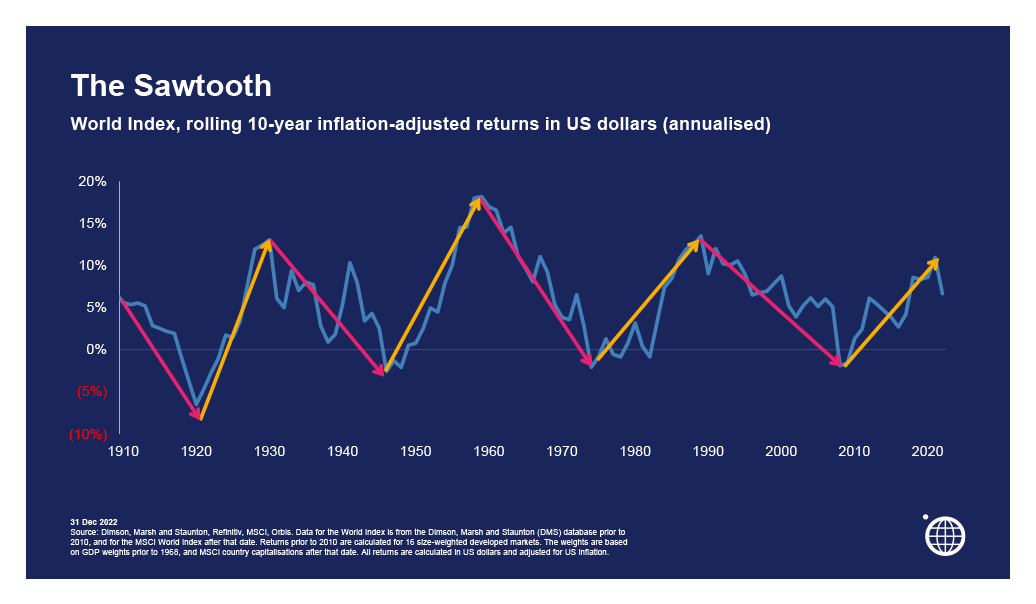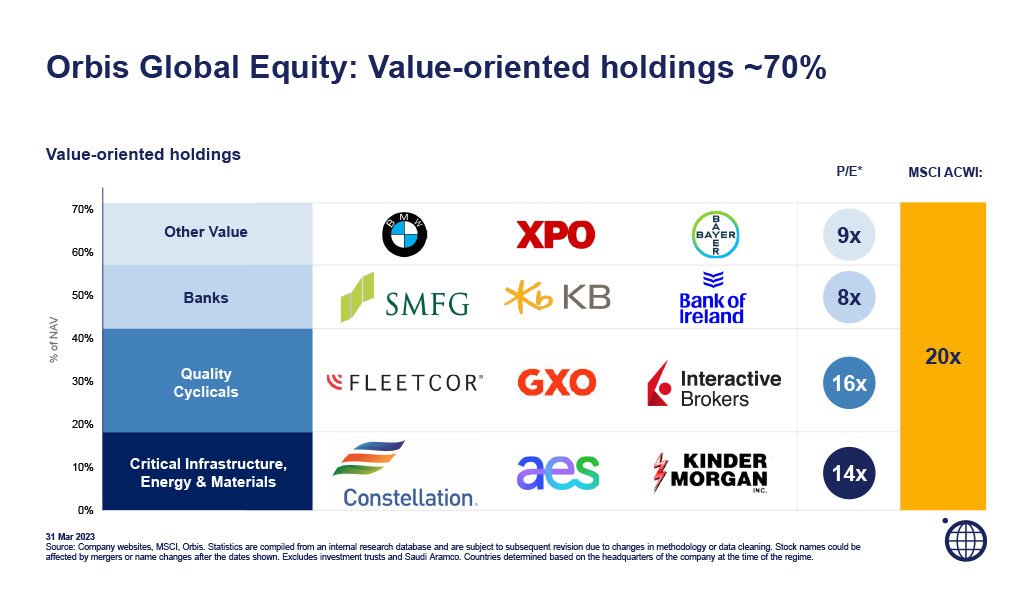Stockmarket boom to stockpicker’s paradise

Orbis
For anyone expecting the phenomenal stockmarket returns of the last decade to keep rolling, we have some sobering news. They probably won’t. If history is any guide, the best of times for investors tends to be followed by the worst of times. Given the post-GFC era was an amazing period for global equities, the next decade could prove much more challenging. But more than 30 years of contrarian investing has taught us that good stockpicking results can make an enormous difference when equity markets are generally weak, and now, more than ever, is the time to invest differently.
Below we assemble the key takeaways from our observations of the current market environment that investors should consider when making decisions.
The good times don’t roll
If the best of times really have come to an end, what can investors expect from the coming period? Whilst we don’t own a crystal ball, the following chart (which we call “The Sawtooth”) paints quite an ugly picture of what the next decade or so could look like. History demonstrates that periods of incredible up-cycles are followed by decades-long periods where returns are disappointing (and sometimes negative after inflation).

With the bubbly excesses of the previous decade only just starting to deflate, and valuation gaps still astonishingly wide, it’s likely markets are a long way from completing the post-bubble deflation process that has been typical of history. Put simply, we think there is likely more pain to come.
Embrace regime change
Faced with the reality that the worst of times are upon us, how can investors do better than the market? One of the most important lessons from history is that the winners (the stocks that perform well) rarely persist from one cycle to the next, meaning investors hoping to outperform can’t simply invest in the same things that did well in the previous decade. To do better than the market, you need to invest in things that are different from what’s been winning lately – the stocks likely to become the market leaders in the new regime. And that’s where things get exciting for active, contrarian, value-orientated investors.
Valuation matters
Because the most recent “everything bubble” rose to such dizzying heights, it gave rise to historically wide valuation gaps between the “haves” (growth stocks) and the “have-nots” (value stocks). In fact, valuation gaps today are as wide as they have been at any time since the Great Depression—almost 100 years ago—and remain wider than they were at the peak of the Tech bubble! Valuation gaps matter because they are a good indicator of forward returns for value stocks compared to their growth counterparts. As the “everything bubble” continues to deflate and valuation gaps narrow, richly priced growth stocks may suffer, giving cheaper value stocks the opportunity to thrive. This provides some exceptional opportunities for astute investors who combine the benefits of a long-term view with a willingness to look very different.
Exploiting the opportunity
As contrarians, we are naturally drawn to areas of the market that are out of favour and thus potentially undervalued. Although we are not beholden to any particular style of investing—be it value or otherwise, today we are finding the best opportunities in the market are among value stocks. Given its current attractiveness, it should come as no surprise that Orbis Global’s exposure to the value factor is currently at a record high, with value-oriented holdings accounting for around 70% of the portfolio. In particular, we are finding opportunities in areas like critical infrastructure, energy & materials, quality cyclicals, and selected banks, as illustrated in the chart below, which makes us very excited about the potential for relative returns, even as the broader market eyes a protracted “worst of times” phase.

Perhaps the most striking feature about the value-orientated holdings our bottom-up, contrarian research has identified is just how cheap they are compared to the World Index, which trades at about 20x earnings. These are a collection of businesses that we believe are better positioned for the coming environment and trade at much lower multiples than the World Index.
Blunting “The Sawtooth”
If, as “The Sawtooth” predicts, the market is facing a prolonged period of disappointing returns, there’s one clear way investors can avoid the same fate – invest differently to the market. With just an 8% weighted overlap with the World Index and 70% of the portfolio exposed to the value stocks poised for outperformance, Orbis Global helps investors achieve the diversification required to withstand the challenging environment ahead. So, whilst the good times might be over for the market in general, the future is much brighter for savvy value-orientated investors willing to think and invest differently.

Shane joined Orbis in 2014 and is a member of Orbis’ team of investment counsellors, responsible for servicing Orbis’ institutional clients and investment consultants. He currently focuses on Orbis’ Emerging Markets Equity Strategy, where he acts...
Expertise

Shane joined Orbis in 2014 and is a member of Orbis’ team of investment counsellors, responsible for servicing Orbis’ institutional clients and investment consultants. He currently focuses on Orbis’ Emerging Markets Equity Strategy, where he acts...
